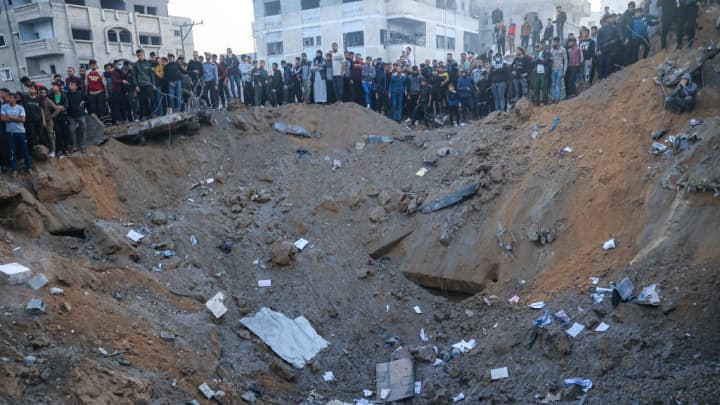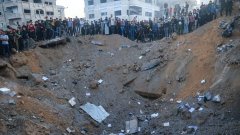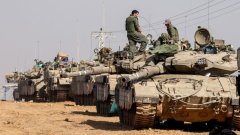
The Gaza Strip faced heavy bombardment for a third night since the seven-day pause in fighting ended on Friday, as the Israeli offensive shifts to the refugee-packed south of the enclave.
"We fought strongly and thoroughly in the northern Gaza Strip, and we are also doing it now in the southern Gaza Strip," Israel Defense Forces Chief of Staff Herzi Halevi told reservists on Sunday. That's the clearest signal so far that a much-feared Israeli offensive is set to envelop the south of the Gaza territories, where hundreds of thousands of displaced Palestinian people have been forced to evacuate at Israel's instructions.
"Wherever there is a stronghold, the IDF operates. The Israeli forces are fighting terrorists face-to-face and killing them," IDF spokesperson Daniel Hagari told reporters in a .
The Israeli military, whose stated goal is to dismantle Palestinian militant group Hamas and recover all hostages in its custody, said in an overnight Telegram update that it has struck roughly 200 Hamas targets, separately reporting it killed a senior Hamas commander, Haitham Khuwajari, head of the Shati Battalion. CNBC could not independently verify the reports.
"The goals in the northern section have almost been met," Brigadier-General Hisham Ibrahim told Israel's Army Radio, according to Reuters. "We are beginning to expand the ground maneuver to other parts of the Strip, with one goal: to topple the Hamas terrorist group."
The IDF estimates that 137 hostages remain held by Hamas in the Gaza Strip in conditions unknown, following hostage swaps for the release of detained Palestinian civilians that were carried out during the cease-fire. Israel has separately begun to declare some of the missing as dead in captivity in an attempt to grant closure to grieving relatives, , saying that a three-person medical committee has been studying and cross-referencing video footage from the Oct. 7 terror attacks and the testimonies of released hostages.
Those measures can help determine the status of a captive, even if no doctor has formally pronounced a death, said Hagar Mizrahi, the head of the panel and a health ministry official.
In the Gaza Strip, Israeli attacks have coalesced around the southern city of Khan Younis, where Israel suspects that Hamas leadership is entrenched in a spiderweb of underground tunnels. The IDF has been urging Palestinian civilians to evacuate certain parts of the city, according to a Google-translated .
The south of the Gaza enclave was previously considered safe territory for refugees and home to the strip's few remaining fully functional hospitals, following relentless bombardment in the north.
Torrential fusillades now engulf Khan Younis, with the IDF claiming on Telegram that the Israeli air force struck over 50 targets locally on Dec. 2.
"A night of utterly relentless bombardments. I cannot stop thinking about the 1.8 million people in the south. I don't think there was more than a five or 10 minute-period throughout the course of the night, and I really didn't sleep, where something wasn't flying overhead or the sky being lit up," UNICEF spokesperson James Elder, who is on site, .
"Despite what has been assured, attacks in the south of #Gaza are every bit as vicious as what the north endured," he added on social media.
The targeting of Khan Younis comes mere weeks after the IDF urged Palestinian people to take refuge south of the Wadi Gaza wetlands in the strip amid decimation in the north of the enclave — and raises questions over where civilians should seek shelter next. The U.S. has previously said that the conflict cannot result in forceful Palestinian displacements.
A senior U.S. military official told NBC News that he was taken aback by the ferocity of Israel's resurging offensive after the end of the seven-day truce, in line with recent pleas from the White House entreating Israel to bolster its efforts to protect civilians in the enclave. One of three international mediators of the lapsed cease-fire, the U.S. has otherwise stood steadfast in its support of Israel, repeatedly condemning Hamas and defending its ally's right to self-defense.
"We've designated a special humanitarian zone in southern Gaza, close to Khan Younis, which, yes, isn't perfect, but it is the best currently available solution that we have," IDF Jonathan Conricus said in a televised CNN interview.
"We are not trying to displace anyone. We are not trying to move anyone from anywhere permanently. We have asked civilians to evacuate the battlefield," .
Washington itself has been drawn into the fire. The U.S. Command Center on Sunday reported that three commercial ships — the Unity Explorer, the Number 9 and the Sophie II — came under fire in the popular Red Sea transit route from missiles deployed from Yemeni areas controlled by Iranian-backed Houthi rebels. The offensives prompted the patrolling U.S. navy destroyer, the Carney, to shoot down several Houthi drones, with only minor damage and no casualties reported, U.S. Central Command (CENTCOM).
Houthi spokesperson Yahya Saree against the Unity Explorer and the Number 9 on behalf of the group, saying the former vessel was targeted by an anti-ship missile, with the second ship pursued by a sea drone. The Houthis claimed that both vessels had rejected warnings from Yemeni naval forces, reiterating that "all Israeli vessels or those linked to Israelis" will become a "legitimate target" — a threat first levied when the militants seized the Galaxy Leader cargo ship, which is unaffiliated with Israel, in November.
"These attacks represent a direct threat to international commerce and maritime security," CENTCOM said. "We also have every reason to believe that these attacks, while launched by the Houthis in Yemen, are fully enabled by Iran. The United States will consider all appropriate responses in full coordination with its international allies and partners."
Repeated anti-Israel offensives from Houthi operatives, Bashar al-Assad's Syrian regime and Lebanese Hezbollah militants — all of whom are sponsored by Iran and regarded as Tehran's proxies by some in the international community — have fueled concerns that the Israel-Hamas conflict could spill into the broader Middle East. Tehran has repeatedly said that these forces of "resistance" act independently.



